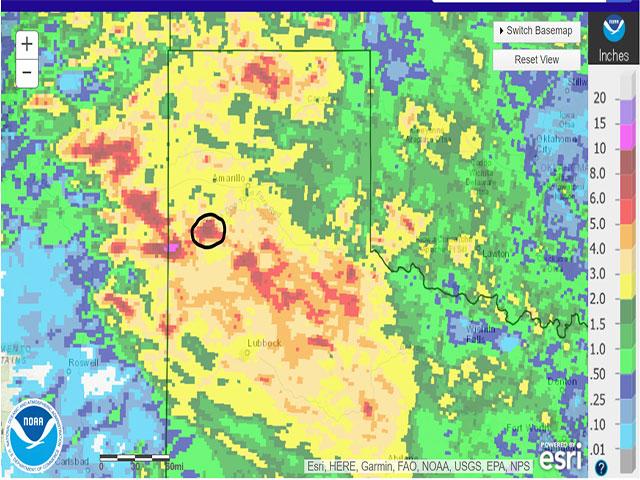Texas Flooding Causes Cattle Losses
Total Cattle Losses Uncertain After Texas Panhandle Sees Flooding From Heavy Rains
OMAHA (DTN) -- Recent severe flooding in the panhandle of Texas caused cattle losses in the largest cattle-feeding region of the country.
Ben Weinheimer, president and CEO of the Texas Cattle Feeders Association, told DTN that producers in the Hereford area as of Wednesday, May 31, were unsure about the extent of the livestock losses.
"The outpouring of support for our members has been tremendous and we are so thankful," Weinheimer said.
"We're still working to move water and it could be a few more days before we know the full extent of losses and damages," Weinheimer said last week. "However, the severity of the flooding caused by this unprecedented natural disaster has been devastating and we're working to do everything we can to support our members during this difficult time."
Laura L. Lopez, media and community relations manager at the Texas Commission on Environmental Quality, said the commission has been focusing its efforts on helping clean up at the Circle 3 Feed Yard in Hereford. Circle 3 operates a 25,000-head facility.
"The TCEQ Amarillo office is providing assistance to the Circle 3 Feed Yard to ensure that dead livestock and any other debris are disposed of in accordance with TCEQ rules and regulations," Lopez told DTN.
"TCEQ cannot confirm the number of potential cattle lost," she said.
P[L1] D[0x0] M[300x250] OOP[F] ADUNIT[] T[]
John Robinson, senior vice president for communications for the National Cattlemen's Beef Association, told DTN the worst of the flooding happened in the Hereford area. Several large feedyards are located in the Hereford area, he said.
While all of the feedyards in the region saw large amounts of rain, only one saw significant flooding, he said. This was a smaller, family-owned facility. This feedyard was located in a low area with a nearby river, which caused the flooding, he said.
"Reports from the area that most all of the floodwaters have now receded," Robinson said last week.
Robinson added it is difficult to assess how many cattle were lost in the flooding, but he did say social media accounts of mass losses were inaccurate.
Reb Wayne, director of communications at the Texas Department of Agriculture told DTN on Wednesday, May 31, that officials hope to have a cattle-loss estimate soon.
"Undoubtedly, there will also be crop losses as planting on a number of crops in the area had just been completed," Wayne said. "Drinking water is the immediate concern and issue."
ShayLe Stewart, DTN livestock analyst, said that as of Tuesday, May 30, death toll counts were estimated to range anywhere from 3,000 to 10,000 head. This event could have a short-term effect on the cattle, she said.
"This could potentially have a positive effect on the cattle market in the immediate future as front-end supplies of market ready cattle are desperately thin," Stewart said.
"But, long term, this won't have an effect on the market, as 10,000 head only accounts for 1.6% of the market's weekly slaughter production on a week where roughly 620,000 head are processed."
DTN Ag Meteorologist John Baranick said much of the rainfall fell the evening of Friday, May 26, into the morning of Saturday, May 27. It wasn't a huge thunderstorm, but it just sat on top of the Hereford area, and it really did not move much.
Rainfall totals were estimated to be several inches in a fairly short period of time, with Hereford estimated to have received up to 10 inches of rain. "The city got it bad," Baranick said.
"It was a relatively small area. Flood warnings are gone in the region, the waters receded quickly from a combination of drought, sandy soil and low soil moisture," he noted.
On May 25, the U.S. Drought Monitor showed Deaf Smith County, where Hereford is located, was still under D3 Extreme Drought.
Russ Quinn can be reached at russ.quinn@dtn.com
Follow him on Twitter @RussQuinnDTN
Todd Neeley can be reached at todd.neeley@dtn.com
Follow him on Twitter @DTNeeley
(c) Copyright 2023 DTN, LLC. All rights reserved.






